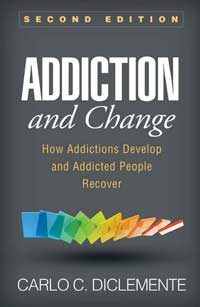 364 pages
364 pages10 CE credits
Course Enrollment
$220.00
Add to Cart
All exams are taken online. The exam for this course will be available in "My Courses" immediately upon enrollment. Note the book is not included.
The book is available for purchase from Amazon.
As an Amazon Associate we receive a rebate from qualifying purchases.
ADDICTION AND CHANGE
How Addictions Develop and Addicted People Recover, 2nd Edition
Carlo C. DiClementeGuilford Publications, 2018
DESCRIPTION
Not everyone who experiments with substance use or risky behavior becomes addicted, and many who are addicted have been able to recover. This authoritative book, now revised and updated, has given tens of thousands of professionals and students a state-of-the-art framework for understanding the journey both into and out of addiction. From Carlo C. DiClemente, codeveloper of the transtheoretical model (TTM), the book identifies the stages and processes involved in initiating, modifying, maintaining, or stopping any pattern of behavior. Grounded in extensive research, and illustrated with vivid case examples, the book shows how using the TTM can help overcome obstacles to change and make treatment and prevention more effective.
New to This Edition:
• Incorporates 15 years of research advances, contemporary prevention and treatment approaches, and the ongoing development of the TTM
• Chapter on current developments in intervention research
• Expanded discussions of neuroscience; self-regulation; behavioral economics; self-help, mutual help, and spirituality; motivational issues; "process addictions" (gambling and sex addiction); and more
• Deeper coverage of risk and protective factors across adolescent and young adult development.
The reader will be able to:
• Describe the Transtheoretical Model
• Apply the Model to the clinical and research problems in addictions and recovery
• Review traditional theories and literature of addictions
• Investigate prevention, treatment and tailoring interventions
• Describe the stages of change and the backwards and forwards movement in all stages
• Recognize that factors that are good risk prevention in one stage may add to the risk in another stage
• Explain the common deficits in research on addictions
• Apply the change processes included in the stage of Contemplation for recovery
AUTHOR
Carlo C. DiClemente, Ph.D., is Professor and Chair of the Department of Psychology at the University of Maryland, Baltimore County. Dr. DiClemente has published numerous articles, chapters, and books, including the coauthored SUBSTANCE ABUSE TREATMENT AND THE STAGES OF CHANGE and GROUP TREATMENT FOR SUBSTANCE ABUSE. He has done clinical and research work in substance abuse treatment for 20 years. He received the Maryland Psychological Association's Distinguished Contribution to Scientific Psychology award. He won one of five 2002 Innovators Combating Substance Abuse awards given by the Robert Wood Johnson Foundation.
EDITORIAL REVIEWS"This masterful book provides an overall framework for understanding how people take up addictions and how they move away from them. The second edition organizes a wealth of recent research about prevention, treatments, and biological and social influences. It puts knowledge about every aspect of psychosocial treatments for addictions at the reader's fingertips, and includes interesting, relevant case studies. DiClemente is an excellent writer with a relaxed and engaging style and a passion for his subject. This is an invaluable resource for college courses on addictions--I can't wait to use it in my classes."
--Theresa B. Moyers, PhD, Department of Psychology, University of New Mexico
"Addiction and Change, Second Edition, incorporates the considerable body of addiction-related research that has accumulated over the last dozen years. DiClemente presents an important integration of many areas of research and advocates a personalized approach to treatment planning. He emphasizes that achieving and maintaining change is a process, not a product. This book will expand therapists' toolboxes while serving as a guide for case conceptualization. Well done!"
--Linda Carter Sobell, PhD, ABPP, and Mark B. Sobell, PhD, ABPP, Center for Psychological Studies, Nova Southeastern University
"The updated second edition attests to the major, expanding influence of the TTM on our understanding and treatment of addictive behavior. Decades of research inspired by the TTM are well reflected here; the book is also replete with references to other approaches and is sprinkled with clinical case examples that illustrate and amplify. Especially highlighted is the broader context of cultural and social factors that affect the processes of change. The author's personal anecdotes and self-reflection add a relevant personal touch to the book, which could easily serve as a text for the large swath of disciplines aiding those on their journey through change."
--Peter M. Monti, PhD, Donald G. Millar Distinguished Professor of Alcohol and Addiction Studies and Director, Center for Alcohol and Addiction Studies, Brown University
"I thoroughly enjoy DiClemente's ability to take complex concepts and translate them into language that therapists and counselors can understand and utilize with their patients. More than most textbooks I use with graduate students, this one gives depth and texture to the idea of 'meeting clients where they are at.' Students and therapists consistently feel that the book helps them individualize treatment strategies and interventions more than any other source. I will definitely assign the second edition in my courses."
--Kevin C. Gilliland, PsyD, Adjunct Faculty, Department of Dispute Resolution and Counseling, Southern Methodist University; Executive Director, Innovation 360 Dallas
ISHK CE at Home
1702-L Meridian Ave., #266
San Jose, CA 95125-5586
This website uses cookies to ensure you get the best experience on our website. Learn more
